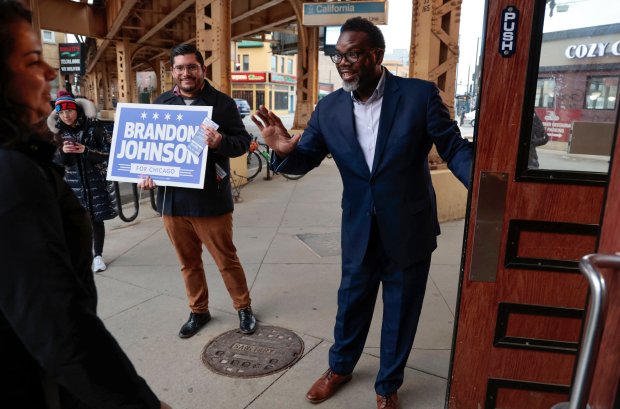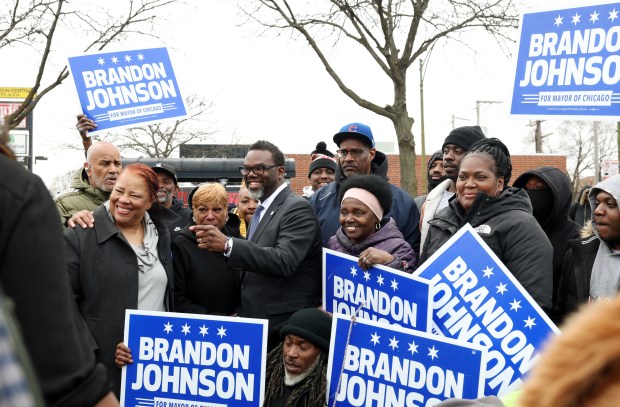A consulting firm has helped Mayor Brandon Johnson’s political organization with fundraising while also lobbying his City Hall office, sparking questions from ethics experts on whether reforms are needed to prevent companies from pursuing both endeavors at the same time.
Mercury Public Affairs, a New York City-based political strategy firm, has been lobbying Johnson since July 2023 on economic and labor causes, according to a Tribune examination of city lobbyist registration records. But starting this year, the company’s consulting division also worked for Johnson’s political fund, state campaign finance records show.
Wearing both hats, though uncommon, is not a violation of state or city ethics codes. But it is a dynamic that good government watchdogs said raises concerns about the appearance of a conflict of interest for a firm seeking to influence the mayor’s office while also working to raise money for him.
State campaign finance records show Johnson’s political campaign spent $25,000 in May on “Fundraising Consulting” by Mercury Public Affairs, a national firm that consults on government, nonprofit and business issues.
While Zach Koutsky, Mercury’s Chicago-based lobbyist seeking action from Johnson’s office, mainly works in progressive politics, the firm is also co-chaired by Susie Wiles, a top adviser to the 2024 campaign of former President Donald Trump, the Republican nominee for president.
Johnson campaign spokesperson Jake Lewis declined comment on whether a firewall is in place between Mercury consultants hired by the mayor’s political fund and the firm’s City Hall lobbyist. Mercury spokesperson Kuae Noel Kelch did not respond to requests for comment.
In a statement, Lewis said: “Our campaign is in compliance with all state and local campaign finance laws and regulations.”
However, retired University of Illinois at Chicago political science professor Dick Simpson said the situation of lobbyists and consultants working under the same umbrella nonetheless calls for revisiting the city ethics ordinance.
“It would be much better if (Mercury) weren’t doing both things,” said Simpson, a former Chicago alderman who donated to Johnson’s predecessor, Lori Lightfoot. “Lobbyists are lobbyists, and campaign finance people are campaign finance people. That industry has changed a lot over the last few decades, but there is no standard for this situation. (There) probably should be.”
Simpson said it’s worth exploring “a reasonable set of rules” to codify a firewall. He added that the “unusual situation” has been rare because political consulting and lobbying firms have traditionally been separate.
“In general, there should be probably a prohibition against being involved in the election of city officials and the lobbying of city officials,” Simpson said. “You could simply say that firms that do fundraising for candidates for city office can’t lobby City Hall. … It’s sort of an interesting new phenomenon because of the way firms that do fundraising and do lobbying have evolved over the last couple of decades.”
Lobbyist influence at City Hall has long raised thorny questions about the role of money in politics, with numerous ethics advocates proposing regulations over the years to rein in the individuals who seek various city actions from new ordinances to tax breaks. Most recently, the Johnson administration has faced heat from the mayor’s handpicked Ethics Committee chair, Ald. Matt Martin, 47th, over the latter’s attempts to ban lobbyists from donating to mayors and mayoral candidates.
Besides Mercury, Johnson’s political campaign has paid two other firms for fundraising consulting and services since he announced his run for mayor in 2022: Middle Seat and Call Time. State records show Johnson’s most recent campaign expenditures for the Washington, D.C.-based Middle Seat, which focuses on progressive candidates, were last October. Call Time, a California firm that specializes in software, was billed until the end of the runoff campaign.
Johnson raked in $126,000 in political fundraising during the first quarter of 2024 and $114,000 in the second, campaign finance records show. He had about $2 million on hand by the end of June. It’s not clear from state campaign finance records how much of his haul was raised through efforts of any of the consulting firms.
Regarding the role of Mercury, good government advocates who spoke with the Tribune said the firm’s multiple hats with Johnson could pose a perception issue regardless of whether a firewall is in place.
“The problem isn’t just who was employed by which division,” Jay Young, senior director at Common Cause, told the Tribune. “It’s often about the appearances.”
Kent Redfield, a professor emeritus of political science at the University of Illinois at Springfield, added that potential conflicts like this indeed have a “corrosive” impact on trust in government, even without evidence of wrongdoing.
“The firm has put itself in a position where it is being cross-pressured,” Redfield wrote in a statement to the Tribune. “The only way to eliminate the conflict of interest would be for the firm to stop providing services to the Mayor’s candidate committee or stop representing client who wants the Mayor to take an action.”

Koutsky, Mercury’s City Hall lobbyist, is a longtime Chicago political consultant who also serves as the firm’s managing director. City lobbyist records show that in the most recent quarter, which ended in June, he represented the following clients in lobbying the mayor’s office: the Illinois Nurses Association, the Independent Drivers Guild, Economic Security Project Action, the Chicago Federation of Musicians and the Illinois Pipe Trades Association.
Those groups have had various interests in city business, some aligned with Johnson’s agenda and some not. For example, the nurses association most recently sought influence on “Issues related to city budget and nursing staff,” following passage of the mayor’s first budget, which added 43 nursing positions within the Public Health Department.
For the Economic Security Project Action, Koutsky lobbied on “Issues related to economic justice” this past quarter. The organization was tapped in May to take part in the mayor’s advisory group on a guaranteed income pilot, after an earlier fall announcement that the nonprofit would partner with the city on planning Chicago’s first municipally owned grocery store.
Koutsky lobbied for “Issues related to working musicians and cultural programs” regarding the musicians group from the start of this year to the end of June. In April, the mayor’s office announced a $12 million Artist Relief and Works Fund that supplements artists and cultural organizations, funded by the city’s share of the federal American Rescue Plan Act stimulus package.
Meanwhile, the pipe fitters opposed a Johnson-backed ordinance to phase out gas stoves, which is stalled in the City Council.
And the Independent Drivers Guild is a group that has pushed for the passage of legislation to strengthen labor protections for ride-share drivers.
David Orr, senior policy adviser to Reform for Illinois, said the “prudent” thing to do would be to ask the Chicago Board of Ethics or other government watchdog to issue an opinion on the situation with Mercury. (The ethics board’s executive director, Steve Berlin, did not comment on whether changes are needed, beyond noting, “I have not seen this kind of arrangement.”)
“I think it needs to be looked into or explored,” Orr said. “We don’t want to find (that) because we’re not being aggressive in exploring some of these things … that we’ve opened up another can of worms.”
The Tribune’s Gregory Royal Pratt contributed.



